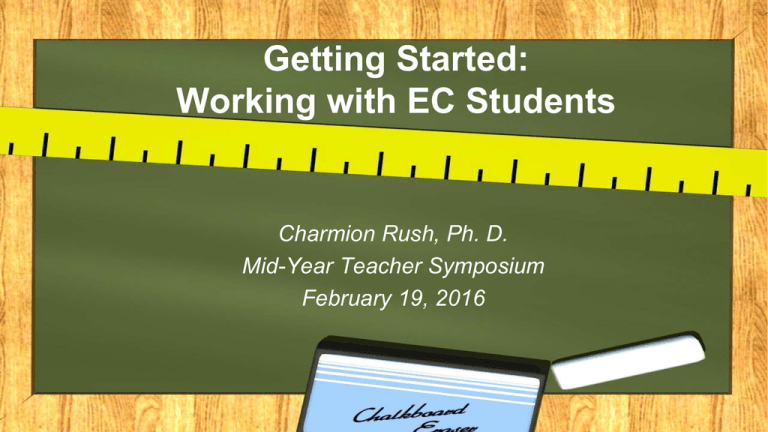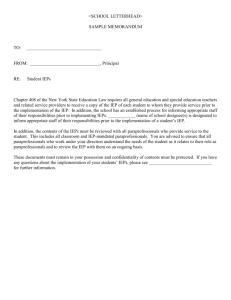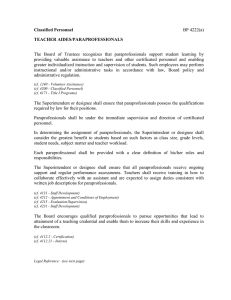Getting Started: Working with EC Students Charmion Rush, Ph. D. Mid-Year Teacher Symposium
advertisement

Getting Started: Working with EC Students Charmion Rush, Ph. D. Mid-Year Teacher Symposium February 19, 2016 PURPOSE This session will help you SURVIVE and THRIVE as a first year teacher. You will receive practical advice, tools, and suggestions to get you started! “Teaching should be your passion calling”. Getting Started Resource room, self-contained classes, or inclusion setting. To make your job easier and more rewarding… – Ensure the welfare of your children – Create the proper education setting – Find the right information Organization is Key! Student Information Contact info “The parent is always the first teacher”. Medical info IEP at a glance Data collection Behavior plans IEPs “Know your ABCs”. List of due dates Meeting checklists Compliance guidelines Organization is Key! Classroom Information Student Schedules Staff Schedule Procedures Emergency substitute plans Lesson Plans Template that works for you (DI & UDL) Different templates for whole group, small group, individual, paraprofessionals, etc. Include all staff and students “Minimize the disability & maximize the ability”. Set Up Your Routines Early How is the classroom structured? How do we arrive and dismiss? How do we transition? How are different areas of the classroom defined? What is our classroom management system? “No smile before Christmas (classroom management is a must).” How do I earn a reward? When will I receive a consequence? What will it be? What are the expectations in different places, groups, etc.? What are the expectations for paraprofessionals and other staff? * Write these down specifically! This helps clarify your routines and expectations for you, administration, substitutes, paraprofessionals, etc. * Set Up Your Routines Early “Inclusion is about belonging.” Create environments of acceptance (in which everyone belongs). Create environments that are supportive. Use Your Resources Don’t be afraid to ask for help! “Find a good mentor, but everyone is not right for you.” Meet regularly with a mentor Be sure that you have access to a mentor within EC Utilize your district support Ask to observe other classrooms Use technology! (Pinterest, Teachers Pay Teachers, Twitter chats, teacher blogs, etc.) Use Your Resources Council for Exceptional Children NCCEC - North Carolina Council for Exceptional Children Recognize you can’t do it all at once Always stay on top of the non-negotiables Prioritize and focus! “There is never enough time, but it is Ok.” Recognize you can’t do it all at once Consider a monthly focus to specifically work on August: Organizational set-up September: Classroom environment October: Lesson planning November/December: Behavior management January: Reflection and changes from first half of the year February: IEPs March: Home/school communication April: Assessment and data May: Reflection and planning for next year! “ You will make changes over and over, so don’t feel “locked in” to one thing.” Rush’s Words of Wisdom Know your worth (but you don’t know everything). – Be a reflective practitioner Learn to forgive (yourself & your students). Tomorrow is another day. Contact Info: Charmion Rush, Ph.D. Assistant Professor WCU School of Teaching and Learning cbrush@wcu.edu Resources Jordan McNeill, EC Program Specialist, Alamance-Burlington Schools The Special Educator’s Toolkit, by Cindy Golden Step-by-step process for setting up and managing an EC classroom Show Me the Data, by Rina Marie Leon-Guerrero, Chris Matsumoto, and Jaime Martin Tons of ready-to-use (and editable!) templates for data collection www.teacherspayteachers.com Great resource for finding organizational forms, checklists, and templates in addition to lesson materials


